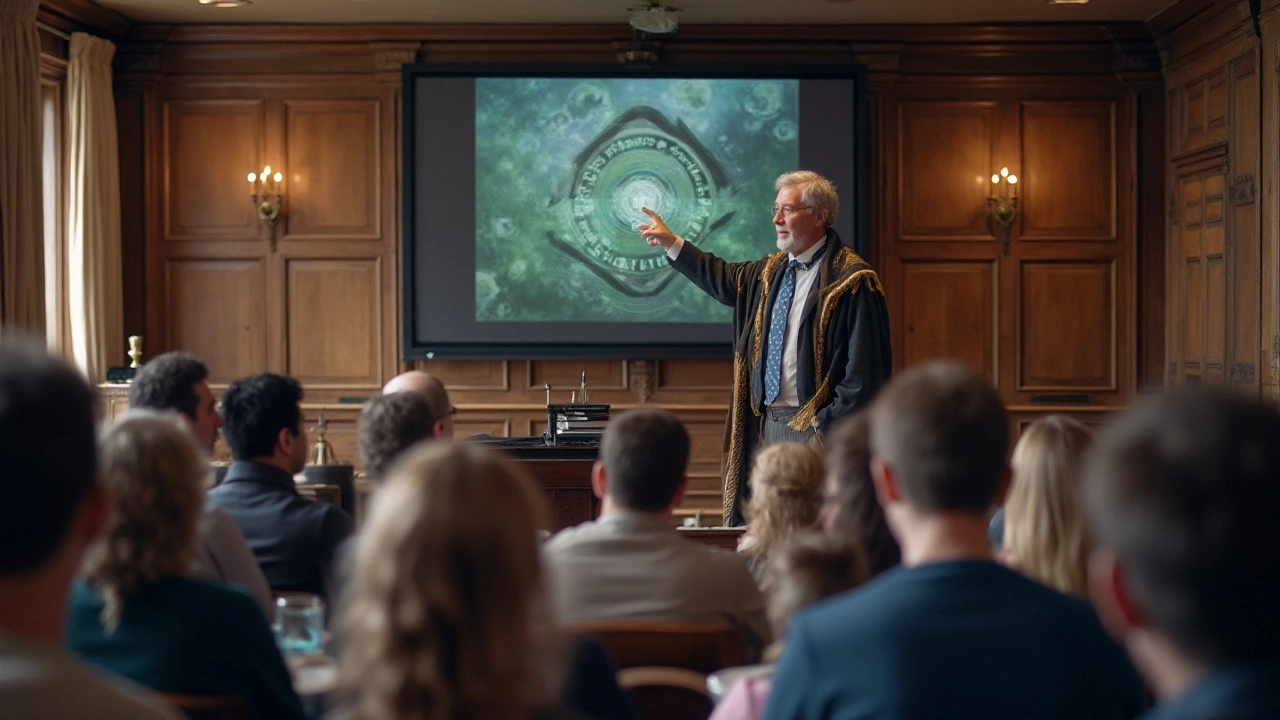The 70 20 10 model of adult learning is a framework designed to structure and enhance learning experiences. It proposes that effective learning for adults takes place in three distinct ways: through the hands-on practice of tasks, interactions with others, and traditional educational settings. This model suggests that a significant portion of our learning – about 70% – is rooted in experiential, on-the-job experiences. Meanwhile, around 20% of learning happens through social interactions, such as discussions and mentoring. The remaining 10% comes from formal educational courses and workshops.
Understanding this model can be transformative, particularly in business environments where continuous learning is crucial. By recognizing how adults best assimilate new information, this approach offers a flexible path to knowledge acquisition. For those keen on personal growth and professional development, the 70 20 10 theory provides a guide to allocate time and resources efficiently, ensuring a balanced and comprehensive learning experience.
- Origins of the 70 20 10 Model
- Breaking Down the 70 20 10 Ratio
- Experiential Learning and Its Impact
- Importance of Social Learning
- The Role of Formal Education
- Applying the 70 20 10 Model in Real Life
Origins of the 70 20 10 Model
Ever wondered how adults learn best? The 70 20 10 model takes us to an important step forward in understanding the art of learning beyond traditional educational settings. This concept was born from research conducted by the Center for Creative Leadership in the United States during the 1980s, a time when organizations increasingly recognized the need to improve the effectiveness of their leadership development programs. Through extensive interviews and studies of successful managers, researchers Lombardo and Eichinger laid the groundwork for this impactful education theory.
The fascinating idea behind this model is that it provides a loose framework rather than strict rules, offering a blueprint for growth that acknowledges the varied nature of learning. It allows for flexibility, acknowledging that people's learning needs and preferences differ significantly. When comparing this to more rigid structures, the beauty lies in its adaptability, making it a tool embraced by numerous organizations worldwide. A study by Towards Maturity even showed that businesses that implemented the 70 20 10 framework gained greater engagement from employees.
"Learning is not attained by chance, it must be sought for with ardor and attended to with diligence." - Abigail Adams
A key factor of the 70 20 10 model is its acknowledgment of experiential learning, which comprises the largest percentage. By embracing tasks and challenges, individuals are able to develop critical problem-solving skills and gain invaluable insights directly from their environments. This kind of real-world application isn't simply a preference but a necessity for effective adult learning.
The social component, accounting for 20%, highlights the vital role of social learning. Peer interactions, mentorship, and communication underline this segment. This aspect reflects the human desire to connect and share knowledge, echoing ancient traditions of learning through storytelling and dialogue. Finally, the formal education portion, though smaller, remains essential in grounding knowledge and providing structure through established educational methodologies.
Breaking Down the 70 20 10 Ratio
The 70 20 10 model divides learning into intuitive, social, and structured components, offering a holistic view of how adults absorb new information and skills. This segmentation begins with the largest portion, experiential learning, which accounts for 70% of the learning process. Experiential learning happens through daily tasks and challenges that adults face in their work environments. It involves applying skills, tackling real-world problems, and gaining insights from successes and failures. This form of learning is powerful because it is direct and relevant, allowing individuals to learn by doing, which in many cases, leads to better retention of information.
The next segment, social learning, contributes to 20% of adult education. This aspect involves learning through interactions with others, quite a natural way for humans to learn. Through conversation, collaboration, and feedback from peers, mentors, or even communities, adults can learn new perspectives and innovative solutions to various issues. Social learning happens in both formal settings like workshops or casual contexts such as team lunches. This method is invaluable because it allows learners to tap into the collective knowledge and expertise of their networks, accelerating learning velocity. The informal discussions often lead to ‘aha’ moments that structured learning may not facilitate.
Finally, the remaining 10% of the model focuses on formal learning, which includes structured courses, workshops, certifications, and formal education programs. This is where traditional education methodologies dominate, leveraging classroom environments and didactic approaches. While it constitutes the smallest portion of the model, formal learning is essential as it provides foundational knowledge upon which experiential and social learning can build. This structured format often ensures that learners have access to expert knowledge and standardized frameworks which are crucial for gaining credibility and understanding complex concepts thoroughly.
Statistics and Insights
Various organizations have studied the impact of the 70 20 10 model, highlighting its practical benefits. A study by the Center for Creative Leadership highlights this framework as a pathway to creating leaders who learn through practice and engagement rather than mere theory. This balance between different learning sources is crucial for comprehensive mastery. In multi-cultural and dynamic workspaces, understanding this balance encourages flexible learning strategies tailored to individual learning preferences.
"Modern learning and development rely heavily on understanding how different experiences contribute uniquely to education. The 70 20 10 model acknowledges diverse learning pathways, allowing learners to construct knowledge strategically." – Jeremiah Sanders, Learning Expert
This model merits attention by those aiming to foster continuous adult learning because it brings to light the necessity of integrating experiential knowledge with interpersonal insights and formal education. By acknowledging and leveraging each aspect of the model, individuals can design personalized and impactful learning journeys, maximizing their growth potential.

Experiential Learning and Its Impact
Experiential learning, a core principle of the 70 20 10 model, emphasizes learning through active involvement and personal experience. Imagine a chef perfecting the art of cooking by spending countless hours in the kitchen rather than just reading recipes or watching cooking shows. This hands-on approach is at the crux of experiential learning, where knowledge is gained by doing, experimenting, and reflecting on actions taken. It is both practical and deeply engaging, setting the stage for profound understanding.
The roots of this approach can be traced back to the work of educational theorists like John Dewey and David Kolb. Kolb's experiential learning cycle distinctly outlines a process where experiences are followed by reflection, then conceptualization, and ultimately experimentation. This ongoing loop reinforces learning and provides a basis for iterative improvement. In essence, each cycle builds on prior knowledge and skills, creating a powerful feedback mechanism that is both self-sustaining and self-correcting.
Many workplaces today are leveraging the advantages of experiential learning with significant results. For instance, consider tech companies that implement hackathons; these events encourage employees to learn new technologies and methodologies by trying them out in real time. Such environments foster innovation and motivation, helping employees become adept at solving complex problems quickly. A study conducted by the Center for Creative Leadership found that experiential learning methods greatly enhance problem-solving abilities and adaptability among professionals.
"Tell me and I forget, teach me and I may remember, involve me and I learn." - Benjamin FranklinUsing experiential learning as part of the adult learning strategy not only enhances technical skills but also promotes personal development. Employees become more self-aware and collaborative, essential attributes in today’s interconnected world. What's more, this method cultivates resilience and a growth mindset, vital tools for navigating the ever-evolving landscape of modern industries.
Incorporating experiential learning into everyday practice requires openness to experimentation and a willingness to embrace new paths. Whether it’s about simulating real-life scenarios or adopting adaptive learning techniques, the aim is to create an environment ripe with opportunities for exploration. Engaging in activities that challenge current understanding forces individuals to adapt, reconceptualize, and thereby grow. This immersive process results in a transformation of skills and knowledge that are deeply embedded rather than superficially acquired.
The impact of integrating experiential learning is multidimensional, reaping benefits that far exceed traditional learning methods. It is the largest component of the 70 20 10 model, not without reason, as it addresses the need for immediate application and relevance, making learning a continual and impactful journey.
Importance of Social Learning
Social learning plays a pivotal role in the 70 20 10 model of adult education. It suggests that around 20% of learning is acquired through interpersonal interactions and relationships. This aspect of the model underscores the power of learning alongside others in both informal and formal settings. Social learning involves engaging in activities like discussions, feedback sessions, and peer collaborations. This kind of learning fosters a deeper understanding of new concepts as learners share their experiences and insights with each other. By interacting with colleagues, mentors, or community members, adults gain unique perspectives and insights, which often leads to innovative solutions and creative thinking. The learning process is enriched when individuals can build on the knowledge and experiences of others, leading to a more dynamic and holistic educational outcome.
One significant aspect of social learning is the development of strong communication and networking skills. As adults engage in conversations about their fields and interests, they naturally enhance their ability to convey complex ideas clearly and persuasively. This is particularly important in professional settings where teamwork and collaboration are key. Moreover, social learning encourages mutual respect and understanding among peers, as individuals learn to value diverse opinions and approaches. By creating an environment that promotes open dialogue and cooperative learning, organizations can cultivate a more competent and adaptive workforce. Historically, education theories such as those put forward by Lev Vygotsky have emphasized the importance of social context in cognitive development, further validating the claims of the 70 20 10 model.
An interesting statistic from a study conducted by the Center for Creative Leadership revealed that nearly 20% of an individual’s capability development happens through the guidance and support of others. This highlights the critical nature of mentorship and peer feedback in professional growth. In fact, some workplaces have successfully integrated formal mentor programs to encourage this form of learning, which not only improves individual competency but also enriches the organizational culture, building trust and fostering a sense of community. To further explore this relationship, research in neuroscience indicates that the human brain is wired to learn through social interaction, making these engagements not just beneficial but essential for effective learning. As humans, we are naturally inclined to observe, mimic, and experiment based on social cues and observations, which accelerates learning and mastery.
To implement social learning effectively, organizations and individuals should consider setting up structured peer-to-peer interactions, networking events, and group problem-solving sessions. These activities can often be more flexible and responsive to immediate learning needs compared to structured formal education. As a suggestion, incorporating technology like video conferencing tools and collaborative platforms can greatly enhance social learning experiences, especially in today’s digital age, where remote work is becoming increasingly common. The integration of these tools can facilitate broader reach and connectivity among learners, making it easier to share knowledge beyond local physical boundaries.

The Role of Formal Education
Formal education holds a vital position within the 70 20 10 model of adult learning, serving as the foundational 10% where structured curricula and educational interventions provide essential stepping stones for knowledge acquisition. This method imparts a disciplined approach to learning, offering standardized qualifications and recognized credentials that can open doors to new professional and personal opportunities. Universities, colleges, and training institutions are the usual providers of this segment, where meticulously planned courses offer deep dives into specific subjects, ensuring that learners gain a comprehensive understanding of the topics they explore.
Besides, formal education introduces individuals to a broad spectrum of ideas, teaching methodologies, and problem-solving techniques, which can be further refined through real-world application. The theoretical frameworks learned in structured environments become the underpinning for practical experiences, enabling learners to apply concepts confidently in dynamic settings. This interplay between theory and practice is a key reason why the 70 20 10 model maintains that formal learning is still relevant, even modern workplaces demand more practical skills.
Moreover, formal education fosters critical thinking and analytical skills that are often crucial in today's rapidly changing global economy. Coursework prompting students to engage with the latest research and evidence-based practices can significantly influence how they perform in their roles. According to a report by the Australian Bureau of Statistics, adults who engaged in formal learning activities were 50% more likely to transition successfully to higher-paying positions compared to those who did not pursue further education. This clearly underscores the importance of structured education paths in career development.
"Education is the most powerful weapon which you can use to change the world." - Nelson Mandela
Incorporating a blend of both online and traditional methods, formal education evolves to meet the needs of today's digital learners. Online platforms like Coursera or LinkedIn Learning provide easily accessible courses that complement the traditional classroom settings. They act as valuable resources for those balancing work and study, ensuring that education remains adaptable and within reach for various lifestyles. Thus, formal education serves not just as a springboard into diverse knowledge realms but also as an adaptable partner in lifelong learning, reinforcing its presence within the adult learning ecosystem.
Applying the 70 20 10 Model in Real Life
Adopting the 70 20 10 model into daily life can truly revolutionize the way adults approach learning and development. This model shifts focus away from traditional classroom settings and redirects it towards a more holistic learning experience. Integrating learning into real situations and environments where adults spend most of their time is key. Let's delve deeper into how each element of this model can seamlessly fit into life's existing framework.
First, consider the 70% experiential component. For adults, this often involves applying new skills or knowledge directly on the job, or through real-world problem-solving. This is learning by doing, which allows one to gain insights, make mistakes, and iterate solutions within a controlled environment. For example, a project manager might tackle new software integration by managing real timelines and resources, thereby gaining practical know-how while on the task. This hands-on experience not only enhances skill development but also boosts self-confidence and the ability to tackle unforeseen challenges effectively. The nuances of this learning are invaluable and often provide deeper understanding than theoretical study alone.
Next, the 20% social aspect centers around interactions with peers, mentors, and other contacts. This is illustrative of learning through conversations, shared experiences, and broadening perspectives. Creating a network of peers and mentors who share knowledge and provide feedback can foster significant growth. In work settings, facilitating discussions, organizing knowledge-sharing sessions, or engaging in peer-to-peer coaching can be particularly effective. As John Darling, an expert in organizational behavior, says,
"The synergy of shared human experience is an unparalleled educator."By embedding social learning into everyday routines, adults can enjoy the richness of varied inputs and the communal honing of skills.
Finally, despite it's smaller portion, the 10% formal learning remains vital as it imparts foundational and advanced structured knowledge. With the rise of digital learning platforms, such as Coursera or Udemy, formal education can now be personalized and accessed from anywhere. Learners can choose specific courses that match their career goals or personal interests, making this formal component flexible and efficient. Blending formal education with experiential and social learning creates a rounded learning model that ensures comprehensive skill development and understanding. It ensures that all bases are covered – from theoretical knowledge to applied know-how.
For businesses and individual learners alike, implementing the 70 20 10 model is about encouraging a continual learning mindset where life itself becomes the classroom. Organizations adopting this approach often find happier, more engaged teams, while individuals experience enhanced job satisfaction and career growth. Applying the adult learning theory in practical terms means creating a culture that recognizes and values all three components for fostering effective lifelong learning strategies.

